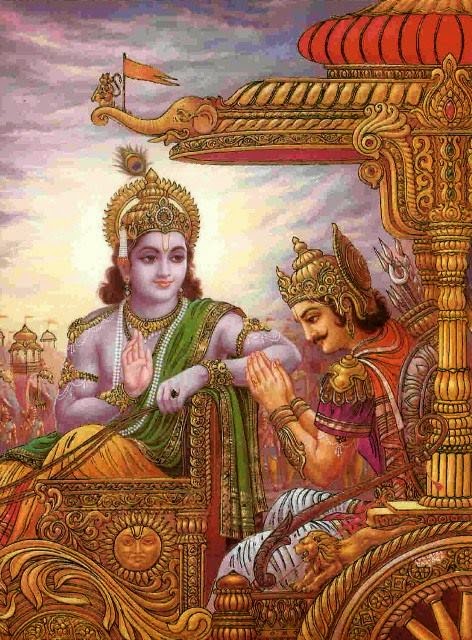Gita : Ch-4. Slo-34.
Srimad Bhagavad-Gita :
Chapter- 4. ( Jnana-karma-sanyasa-yogam )
Slokam- 34. ( Just try to learn the truth by approaching a spiritual master. Inquire from him submissively and render service unto him. The self-realized soul can impart knowledge unto you because he has seen the truth. )
tadviddhi pranipatena pariprasnena sevaya,
upadekshyanti te jnanam jnaninastattvadarsinah.
pranipatena = by namaskaram (obedience and head down);
pariprasnena = by submissive inquiries ;
sevaya = by the rendering service ;
tat viddhi = gain that knowledge;
tattvadarsinah jnaninah = the self-realized seers of truth;
te jnanam upadekshyanti = guide you towards jnanam.
As to the answer to the question by what means is this spiritual knowledge available Lord Krishna is revealing how to attain this knowledge which is altogether different from actions that bestow material rewards. He instructs everyone to fall at the feet of a self-realised beings rendering service to them with faith and devotion and inquire from them with a pure heart about the purpose of life, the true nature of a living being and how to revive one's relationship with the Supreme Being? By these questions and by being pleased by one's sincere service such a self-realised being will guide and instruct one on matters related to the ultimate truth because they have direct experience and wisdom of this and thus will remove all doubts about: Who am I? Why was I born? What is my purpose in life? The self-realised being will dispel all these questions by proper reasoning and evidences from the Vedic scriptures and practical experience and reveal the nature of the individual consciousness and its relationship with the ultimate consciousness which is the goal of all existence. All actions culminate in knowledge when instructed by a self-realised being but never when instructed by those who are not self-realised. By this verse the ancient scriptural adage of : Let one humbly seek a spiritual master who is well learned in the Vedic scriptures and established in the knowledge of the Brahman or the spiritual substratum pervading all existence. The plural sense of the words jnaninah meaning those expert in the Vedic scriptures and darsinah meaning those who realised the ultimate truth denotes that all self realised being will possess this spiritual knowledge. It also infers that if one approaches a person for enquiry and discovers that this person is not self-realised and cannot give this spiritual knowledge then one may approach a spiritual master who is self-realised to attain this knowledge.
One should know that this spiritual knowledge relative to the atma or soul propounded by Lord Krishna to be imperishable. One should learn this well and advance themselves along the path by diligently acquiring wisdom and more by submissively approaching realised beings who have realised the ultimate truth. One should render sincere, dedicated service to them with veneration and humility asking relevant questions about the ultimate truth. These being so advanced in atma tattva or soul realisation have experienced the ultimate reality and being pleased by one's humble demeanour and reverent questions will bless one with divine knowledge which they possess and will impart the transcendental knowledge one is so eager and enthusiastic to learn. If one has not practically realised there atma which is an act of actual perception and situates one in their true nature then such talk about it is merely a hypothesis.
The means to acquire atma tattva or soul realisation is being stated here: How is this knowledge to be acquired? Lord Krishna reveals it is by inquiry. Inquire from a self-realised being by falling submissively at his feet just like a stick before him. Questions should be asked like. What is the goal of human existence and how is it possible to attain it? One should render humble and sincere service to this self-realised being because this person has realised the ultimate truth, fully steeped in the knowledge of the Vedic scriptures, of the Brahman or the spiritual substratum pervading all existence and the intuitive potency which manifests along with it. Such a person will magnanimously instruct one in attaining the ultimate truth.
Although Arjuna is considered a man of wisdom properly raised and educated in the Vedic culture, still illusion has entered his consciousness. This was highlighted in verse sixteen where the words yat jnatva meaning having understood were used to instruct Arjuna.
Since spiritual wisdom will be revealed in detail in later chapters Lord Krishna now begins speaking briefly about the nature of it here.
To be continued .....





Comments
Post a Comment